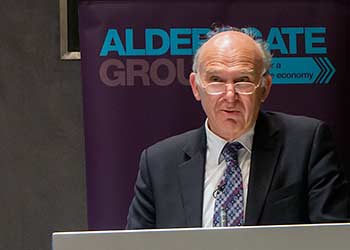The Aldersgate event Banking for Sustainable Growth explored the role the Green Investment Bank (GIB) could play in driving the economic recovery.

Hosted by Bank of America Merrill Lynch, the event attracted nearly 400 people from industry, finance and policy backgrounds.
Vince Cable MP, Secretary of State for BIS, opened the debate talking about the GIB and the Government’s plan to make an initial investment of £3 billion and the plan to bring in £15 billion of private money.
To borrow or not to borrow – that is the question
Echoing the unusual level of cross party support in the House of Commons, the panel tended to agree with each other over the purpose and value of the GIB as an institution.

However, disagreement starts to emerge over the ambition of the bank and the current question mark over its borrowing powers.
Lend me a quid till Tuesday…
At the time of writing the bank has just cleared EU state aid rules but still needs to attain UK legislative approval and royal assent in Spring 2013. However, it is still unclear whether it will have the ability to undertake what is a considered a basic function of banking – the power to borrow funds.
Representing the BT pension fund (the largest in the UK) Helene Winch emphasised the importance of borrowing powers for GIB to avoid becoming simply another unneeded fund, a position that was reinforced by Ed Matthew from Transform UK which has lobbied for the establishment of the GIB.
Dr Cable stated that borrowing was a clear aspiration and he was still optimistic for all party support. However, as so often in issues of accelerating a green and sustainable economy, apparently the Treasury still needs convincing; it is concerned that if the GIB had the ability to borrow, the debt would show up on government balance sheets.
Conversely, others argue that allowing the GIB to borrow would unlock the doors to significantly more private sector money. German owned KfW has been running for many years and manages to leverage equity at a ratio of 1:26 – far beyond the modest 1:6 envisaged for the early stages of GIB.
Certainty and stability are good for investors and business
Helene Winch stressed that pension funds need to consider an investment context at least 30 years forward and therefore called for policy stability because the asset pricing models the industry uses cope poorly with rapid or dramatic policy changes.
Mike Turnbull (Bank of America Merrill Lynch) saw a key role for GIB to assist with the riskier initial investments needed in developments such as offshore wind – a sector estimated to require £200 billion by 2020. Such a bridge is needed, Turnbull argued, because pension funds will only invest in later operational stages where the risk profile is lower and Basel III liquidity requirements are likely to curb the long term ability of banks to invest.
Is green really green?
The ‘green’ remit for the GIB is currently unclear, blogging on the Guardian Caroline Lucas MP (Panel Chair) highlighted the lack of specific investment criteria.
Peter Young (Aldersgate Group) expressed the need for investment criteria linked to carbon reduction targets and that industrial strategies are targeted where we have competitive advantage.
It is worth noting that the criteria for sustainable technologies are pretty firmly established and embedded into the investment policies and criteria of a number of leading responsible and sustainable investors and the government might do well to avoid reinventing the wheel when it comes to establishing such details.
There is a big job ahead
There is huge demand for investment in ‘green economy’ projects that will support jobs and growth while tackling a range of environmental issues, including offshore electricity generation, energy efficiency programmes and infrastructure development.
The panel seemed to be in agreement that there was a huge and growing need to invest in these green technologies of the future. There was also consensus on the scale of environment challenges which lie ahead; one question from the floor asked if climate change or collapse of the international monetary system was the greatest threat with the panel responding that it was the former which presents the greatest threat (presumably working from the entirely logical notion that it is better to be poor than to be dead).
Ken Smith from Memset, a fast growing SME, asked how the GIB might help support SMEs as the engine for growth and employment and in the economy. The panel acknowledged that there are gaps in support to smaller companies and reflected that long term institutional change was required together with changes in outlook. Dr Cable acknowledged the role of SMEs in the economy and thought the GIB should reflect this in supply chain initiatives.
There is a clear demand for investment support for green innovation and drive and support growth in the wider economy.
Should the GIB be able to effectively support this it will provide valuable assistance to a struggling economy – if it is allowed to grow, ideally to a scale rivalling the subsidies and tax breaks available to other sectors.
Out of the ghetto…
It’s curious that members of the panel felt the need to stress the lack of conflict between green and conventional economic growth (a mantra that, ironically, environmentalists have spent many years teaching politicians and that politicians now feel the need to teach them back) – perhaps reflective of recent remarks from the Chancellor.
…from a part of the system to the system itself
While it’s clear that a bank dedicated to supporting green investment is sorely needed, we need to look beyond sustainability as a niche activity and embed it as a priority in mainstream economics.
As (environmental) sustainability is fundamentally about long term survival and wellbeing, over the long-term there should be no conflict with (economic) sustainability – the economy requires a workforce, consumers and raw materials to operate. The problem – and hence the biggest opportunity – lies in the transition to a green economy where we can remove the damage from continued growth.


Leave a Reply